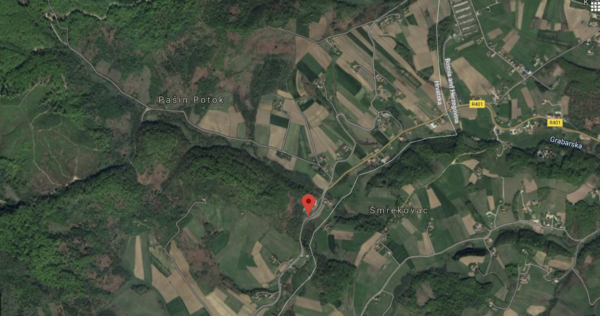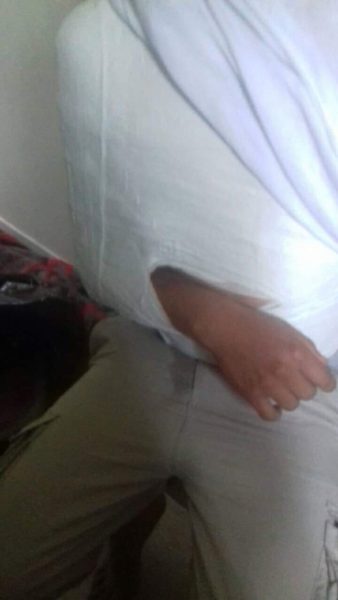“The problem is the colonization, I would not be in Croatia and Bosnia without it.”
| 13.06.2019 | Pašin Potok, Croatia | No Name Kitchen | 45.17096, 15.76723 | Croatia | Bosnia | no | no | yes | no | no | no | 20 - 35 | 12 | Morocco, Algeria, Egypt | 7 | beating (with batons/hands/other), exposure to air condition and extreme temperature during car ride, destruction of personal belongings, theft of personal belongings |
The group of twelve left from Sturlic (BiH) on foot in the evening of June 7th. They continued walking through the interior of Croatia for five days. During this time, the twelve-person group decided to split into two smaller groups of six. On the morning of June 12th, the group had progressed to a point in Croatia that was approximately 65 kilometers away from Trieste. On this day, at around 11:00 am, one of the groups was apprehended by two Croatian police officers. The respondents described that the officers used a layered approach to apprehend the group. They described seeing a olive-drab car, in the style of a jeep, in the forest which they inferred called other officers to look for them.
“You have one car in the jungle, a green car, just to see the guys, and then they call the police to go and collect them”After this first group was apprehended, the respondent described him and his other group-members being searched, along with their bags, and having their money, phones, power banks confiscated as well. Between the two groups, seven mobile phones and ten power banks were also confiscated. They did not receive any of these items back. In total, the respondents described having 190 EUR taken from them which was also not returned. One of the respondents noted how before they were apprehended by the Croatian authorities, he had deconstructed his phone, taking the back case and his battery out and putting them into his bag. When the officers looked at his phone they did not break it further. He was able to retain his phone however the rest of the group had their devices later broken. Reflecting on this event, one of respondents noted how absurd it was that Magrebi men regularly face the stereotype of being thieves from people within the transit community as well as from Croatian police officers when the most rampant theft that they encountered comes from Croatian authorities who regularly confiscate their mobile phones and personal possessions. After this first group of six’s initial capture, they were asked by the officers where they were from. According to one of the respondents, the officers voiced their displeasure towards the group after they said they were from Morocco and Algeria. The first group of six was then loaded into a small, windowless van which arrived to their location after some time. Around 30 minutes later, the second group of six was apprehended by two other police officers, presumably from the same unit.
“Two guys catch the first group, two guys the second group” “You catch the (first) 6 persons at first, you put in the car. Before you put in the car, they say ‘Get up get up’ We get up.Once both sub-groups had been loaded into the same windowlessvan , both of the respondents described a prolonged period of detainment as the van drove around for a period of what felt like ten hours between unidentified locations.
“[The van was] going around to look for other people”The respondents described that over the course of this time, there were four instances in which the back door of the van was opened. The first instance occurred as a result of the air quality in the van. The respondents recalled that it was hard to breathe in the back of the van, due to its overcrowding and a lack of oxygen.
“We don’t have place to breathe, [there was] no oxygen”At one point during their prolonged containment within the back of the van, the respondents described frantically pounding on the walls of the van in an attempt to communicate to the officers in the front of the vehicle that they could not breathe.
“Open the door, oxygen, oxygen, they come around and open the door, [look at us] and close”The group was also denied access to water during their containment. During their detainment in the van, the respondents described their group requesting numerous times to the front of the van for water. After several hours, they described that the door was opened and a single group-member was offered water.
“One police officers asked “You want water?” “Just one guy he gives the water...For what reason?”The respondent inferred that this was an attempt to divide the rest of the group. At another point, the respondents also described the back of the van being opened by an unidentified officer whom they believed to be the leader of the group of police officers.
“The boss for the police arrived, came, opened the door, and closed the door”The respondents described one final occasion during their containment within the back of the van during which one of their group-members, a man from Algeria, began complaining about a problem with his heart. Only one of the group-members spoke English well enough to communicate with the Croatian police officers and was accordingly asked by this man to tell the officers about the medical problem.
“If you don’t take this man to the hospital, he might die here”This exchange happened at around 4:00 pm on June 12th, however an ambulance did not arrive for this man until 2:00 am on June 13th. The ambulance was emblazoned with a red cross on it. The ambulance drivers asked the English-speaking group-member what had happened, took the at-risk Algerian man out of the van, gave him some tablets, brought him back to the car, and made them wait again. The respondents recalled that at this point he wanted to beg to the officers to push them back, even if it meant being hurt by the Croatian police officers, since they were so tired of being in the van. At around 3:00 am on June 13th, the respondents described their van being parked in a secluded, semi-rural area along the Bosnian-Croatian border, outside of Velika Kladusa. Once the back door of the van was opened, the respondents saw that the van was parked with its back side facing down a hill which led to a waterway which separated Croatia from Bosnia. There were seven police officers armed with batons positioned outside of the van. The officers at the push-back location all wielded large batons and were described as wearing uniforms with dark blue shirts with short sleeves and black pants. They also described seeing to smaller police vehicles parked at the push-back site, in addition to the transport van. [caption id="attachment_12985" align="aligncenter" width="600"]
 The approximate location between Pašin Potok (HR) and Šmrekovac (BiH) where the group was pushed-back [45.17096, 15.76723][/caption]The group was then made to exit the van and get into a line. They were told: “Put your right hand on the shoulder of the man in front of you”.
After walking in this fashion closer towards the border-stream, the men were then taken in pairs, two-by-two. The pairs were walked up to the waterway. At this point, the police shouted “Go! Go! Go!” and swung batons at them.
The approximate location between Pašin Potok (HR) and Šmrekovac (BiH) where the group was pushed-back [45.17096, 15.76723][/caption]The group was then made to exit the van and get into a line. They were told: “Put your right hand on the shoulder of the man in front of you”.
After walking in this fashion closer towards the border-stream, the men were then taken in pairs, two-by-two. The pairs were walked up to the waterway. At this point, the police shouted “Go! Go! Go!” and swung batons at them.
“‘Go! Go! Go!’ and beat you to run away into the river”One of the respondents described an observation that frequently the first and last group-members to be pushed back are those who experience the most direct physical violence. Specifically, the respondents noted how they were in the first and second pairs of people to be pushed back.
“I see they is beat “M.”, I am second and I am run” “The first one, the last one, this is the problem”During the push-back, one of the respondents’ collarbone was broken by a stroke from a baton and the other respondent's forearm was bruised from a baton stroke. [caption id="attachment_12986" align="aligncenter" width="338"]
 One of the respondent with his torso set in a cast in order to allow his collarbone, broken in the incident, to heal[/caption]
The respondents described that there were two Egyption men who were part of their group, both of whom were very short, and that when they were forced into the waterway, the water rose up to their chests. They did not know how to swim and risked drowning if they lost their footing.
One of the respondent with his torso set in a cast in order to allow his collarbone, broken in the incident, to heal[/caption]
The respondents described that there were two Egyption men who were part of their group, both of whom were very short, and that when they were forced into the waterway, the water rose up to their chests. They did not know how to swim and risked drowning if they lost their footing.
“After I am in Bosnia, it is night and you cannot see, they broke all the phone, you don’t know the place you are, you know nothing. You must wait until the morning.You don’t know where you are, are you in the north? In Bihac? Nothing.”The group returned back to Miral camp at around 5:00 am later that morning. One of the respondents described entering Miral with dirty clothes, taking a shower, and going to sleep. The respondents voiced their frustration of being forced to return from Croatia to dismal and humiliating camp conditions in Bosnia inside of the IOM-run Miral Camp. After concluding their description of the ordeal that they faced in Croatia, one of the respondents voiced his frustration with the colonial legacy of his country and the extraction of natural resources from Morocco and other migrant-producing countries by wealthy European states.
“The problem is the colonization, I would not be in Croatia and Bosnia without it.”He also commented on what he described as the greater political motivations for violent border controls.
“This is Europe, Croatia maybe in five years [will become part of] Schengen. This is the problem.”
